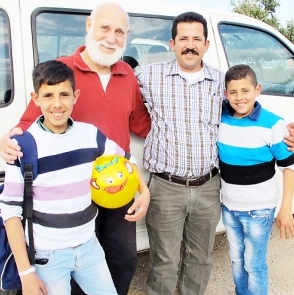
Israel

The Road to Recovery – a grass roots act of reconciliation
BILL STRUBBE
The ill kids may be suffering from cancer, leukaemia or another life-threatening illness, but these two brothers, aged 14 and 15, waiting in the pre-dawn with their father, have the blood disease thalassemia, a genetic mutation affecting the production of haemoglobin, something that is common among Palestinians.
“Two out of six of my children have thalassemia, as well as one of my cousins and an uncle. I would guess that about 300 children in the Jenin area suffer from it,” explains the boys’ father, Norman. “Since there are no dialysis machines in Jenin, we have to travel to Rambam several times a month, and the only way to do this is with the help of Israeli drivers.”
Palestinians with serious health conditions must obtain special permits to receive treatment in Israel, but they are not allowed to drive their own vehicles past the checkpoints.
Round-trip taxi fares would be prohibitively expensive for most. Instead, over 500 Israelis volunteers, through the organisation The Road to Recovery, pick up Palestinians at the border checkpoints and drive them to the hospitals in Tel Aviv, Jerusalem, and Haifa.
Being a passenger in a car with an Israeli licence plate and an Israeli driver, helps to minimise the transit time through the checkpoint. What could take several hours might be reduced to 10 or 15 minutes.
A preponderance of children assisted through The Road to Recovery suffer from thalassemia, particularly clustered in Mediterranean communities. Similar to sickle-cell anaemia, the thalassemia trait is prevalent in climates where malaria was once endemic and confers a degree of protection against malaria, thus it has a selective survival advantage.
If both parents – more likely in isolated or island populations – carry the trait there is a 25 per cent risk that a child will be affected.
From either the disease itself or the frequent blood transfusions, excessive deposits of iron accumulate in the body and these deposits damage the heart, liver and endocrine system. An overtaxed spleen can become enlarged, necessitating its removal.
Anaemia can cause a child’s growth to slow and can delay puberty. Thalassemia can cause the bone marrow to expand, which can result in abnormal and brittle bone structure.
Without regular blood transfusions at least every three months and adequate iron chelation therapy to remove excess iron, most patients with thalassemia would eventually die from it. Neither of those two treatments are available in Gaza and the West Bank, hence help is required from Israeli drivers.
The Road to Recovery was started by Yuval Roth, a member of Kibbutz Magan Micha’el. In 1994, Yuval’s brother Udi was kidnapped and killed in Gaza by Hamas and Yuval decided to do something positive with his grief.
Roth joined the group called Parents Circle – Families Forum, Israelis and Palestinians with loved ones killed in wars and terrorism, and befriended many Palestinians, some of whom shared with him the common need of transportation access to Israeli healthcare facilities.
“Then one day, a man in the forum from Jenin called and told me his brother might have a brain tumour. He had an appointment at Rambam but no way to go,” Roth explained. “He asked if I could drive him, and I agreed.”
When other Palestinians asked for assistance, an eventually overwhelmed Roth recruited friends to help drive children and adults. Within several years The Road to Recovery came together as an “act of reconciliation instead of revenge”. Since 2006, Roth and his team of some 500 volunteers, many of them pensioners like Amatzia Dayan, have been giving Palestinians a lifeline.
“I used to drive all the way into the West Bank to pick up or drop off the children,” explained Dayan, who happens to be Moshe Dayan’s nephew, “but was urged by friends that Jenin was too dangerous. Now I only meet them at the border crossing.”
To date, The Road to Recovery has assisted over 450 Palestinian families, making more than 2 500 hospital trips.
Another volunteer, Israeli-born Rachel who now lives in Los Angeles, said she wanted to participate in a humanitarian peace cause, and through a friend heard about The Road to Recovery.
“After speaking with Yuval and his attempt to promote trust from the ground up on a personal level, I knew it would suit me well,” Rachel explains. “I now help fundraising in the United States and when I’m visiting Israel I participate in driving children.”
Currently Rachel is working on establishing The Road to Recovery on the crowd funding site Global Giving, which will allow donations to receive tax-deduction status.
The Road to Recovery believes that peace among Israelis and Palestinians can only come about through engagement and personal involvement, placing humanity before politics. The deep-seated barriers of distrust existing between Palestinians and Israelis only serve to perpetuate the conflict, and the volunteers seek to break down these obstacles, one drive at a time.




